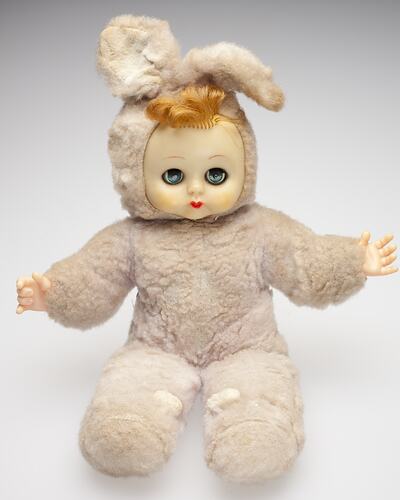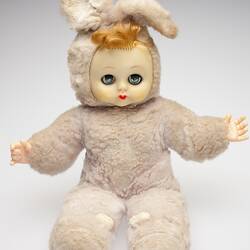Maria's father, Michael Attardi, was a qualified industrial mechanic but because Italy's economy had been impacted by the devestation to industry as a result of World War II, he could only find work as a garbage truck driver with the local Council. Many from the town of Valguarnera were emigrating to Australia as word was quickly spreading of the need for workers in Australia's bourgeoning industrial sector. After enquiring through official Australian government work agencies, he discovered that his skills and qualifications were in high demand and therefore he would be eligible to emigrate via the Australian Government's Assistance Passage Migration Scheme. His family was very unhappy that he had applied to emigrate as they knew he would eventually request that his family join him in Australia and they would not be able to enjoy their three young grandchildren. Michael arrived in Australia on the 'Roma' in 1959. He was sent to Bonegilla where he stayed for three weeks. He was allocated employment in a nearby factory but he heard he could be paid better if he found work in Melbourne. So he hitched a drive into Melbourne with relatives of a man who was sharing his cabin. He found a job the next day paying 2 pounds more than he was offered under government contract. In Melbourne he boarded at first and then later secured a house in Clayton.
In September 1960, Maria, her mother, Philippa, and two younger brothers, Agostino and Vincent, arrived in Australia on the 'Neptunia' from Valguarnera in central Sicily, Italy. Maria was 4 years old at the time and remembers little of the journey, except that her mum was constantly bed ridden due to sea sickness and was also terrified and wouldn't leave the cabin which they shared with a woman coming here as a proxy bride. Consequently Maria and her brother's didn't experience much during the voyage although Maria does remember being taken to the children's play room and playing games on deck. Both Philippa and the proxy bride kept their own company because it wasn't culturally acceptable for women to enjoy themselves without a male guardian.
In 1963 Maria broke her arm and was hospitalized for three weeks at the Alfred Hospital in Melbourne. During her stay she was given a doll she called rabbit by a relative who came to visit. When Maria broke her arm they were sharing a house with two other families, and her father was driving taxis as a night job, trying to save more money so they could buy their own home. When she broke her arm she remembers having no cars or phones and her arm being wrapped up in many towels, she was bleeding profusely, and then being carried into the streets wrapped in blankets until a passing taxi was hailed which took them to the hospital.
In 1967 Maria, her mother and two brothers returned to Italy on the 'Angelina Lauro' with the aim of remaining as Maria's nonni (grandparents) were writing letters detailing how the economy in Italy was improving and many opportunities would be available for dad in his line of work. On the voyage to doll was used by Maria's mother to transport Australian plant seeds to give to relatives, in particular Maria's nonna (grandmother) who loved collecting plants. During this second voyage Maria recalls her mother again being confined to her bunk because of sea sickness and the running riot all over the ship with her brothers. She remembers they were often collected by cabin crew and taken back to the cabin where they again attempted to escape. They sailed through the Suez, seeing the desert on both flanks; and also saw 'black' people for the first time when they came onboard to sell items when the ship docked. Maria recalls 'mum was terrified of the 'blacks' and even though she ventured out to deck to buy gifts she kept such a tight clench on our wrists that they were white when we returned to our cabin'. She also remembers going to one of the big entertainment areas, where she played with a toddler on board, she then asked to carry the child down the flight of stairs, when the ship came to a grinding halt and they all flew down the flight of stairs. Fortunately she only got bruised but the child lost some teeth.
In Italy, Maria's mother immediately commenced plans to resettle. She purchased a large parcel of land where she envisioned they would build a house and metal engineering workshop for dad to run and operate his business. After making enquiries into the permits she would need to build and to open the workshop dad wanted to operate, after 11 months she realised that thee system of ingratiation was still very much in use, that dad would have to bribe council staff in order to get permits to build and run his business, she relayed this to dad via lettergrams. After corresponding with dad as to the pros and cons of re-settling in Italy, Maria's mother decided to return to Australia as she didn't see a strong future for her children in Italy. They travelled back to Australia on the 'Achille Lauro' in 1968, via Cape Town as the Suez was closed. This added an additional week to the voyage. Once again Maria and her brothers had a run of the ship without the discipline of their bedridden sea sick mother confined to their cabin. Maria remembers sneaking out from the cabin on a hot day and watching people in the swimming pool. She couldn't swim but notes 'everyone made it look so easy so I jumped in and had to be pulled out because I sank to the bottom and my brother raised an alarm'. She remembers the most frustrating thing was having forgotten how to speak English after 11 months in Italy and crying a lot because she thought the kids at school would tease her about it. However the ship journey allowed Maria and her brothers to regain their English skills before going back to school when they arrived in Melbourne.
Again the doll was used to smuggle plant seeds; this time Italian vegetable seeds, in particular different types of beans, tomatoes, lettuces and other beneficial greens. When they arrived in Melbourne Maria's mother instructed her never to put the doll down and to always have it clutched. Maria's mother also smuggled seeds in her bra and girdle too, with Maria remembering 'she looked far more curvaceous that she was!'
In Australia they settled in Clayton and Maria's mother always allowed a few plants to seed so she had a continuous supply. She also swapped seeds with compatriots, with the seeds of a particular leafy green vegetable with a bitterish taste that were considered to be extremely healthy and 'good for the blood' being given out widely to paesani.
More Information
-
Keywords
Immigration, Italian Immigration, Italian Communities, Dolls, Immigrant Voyages, Immigrant Shipping
-
Authors
-
Article types

